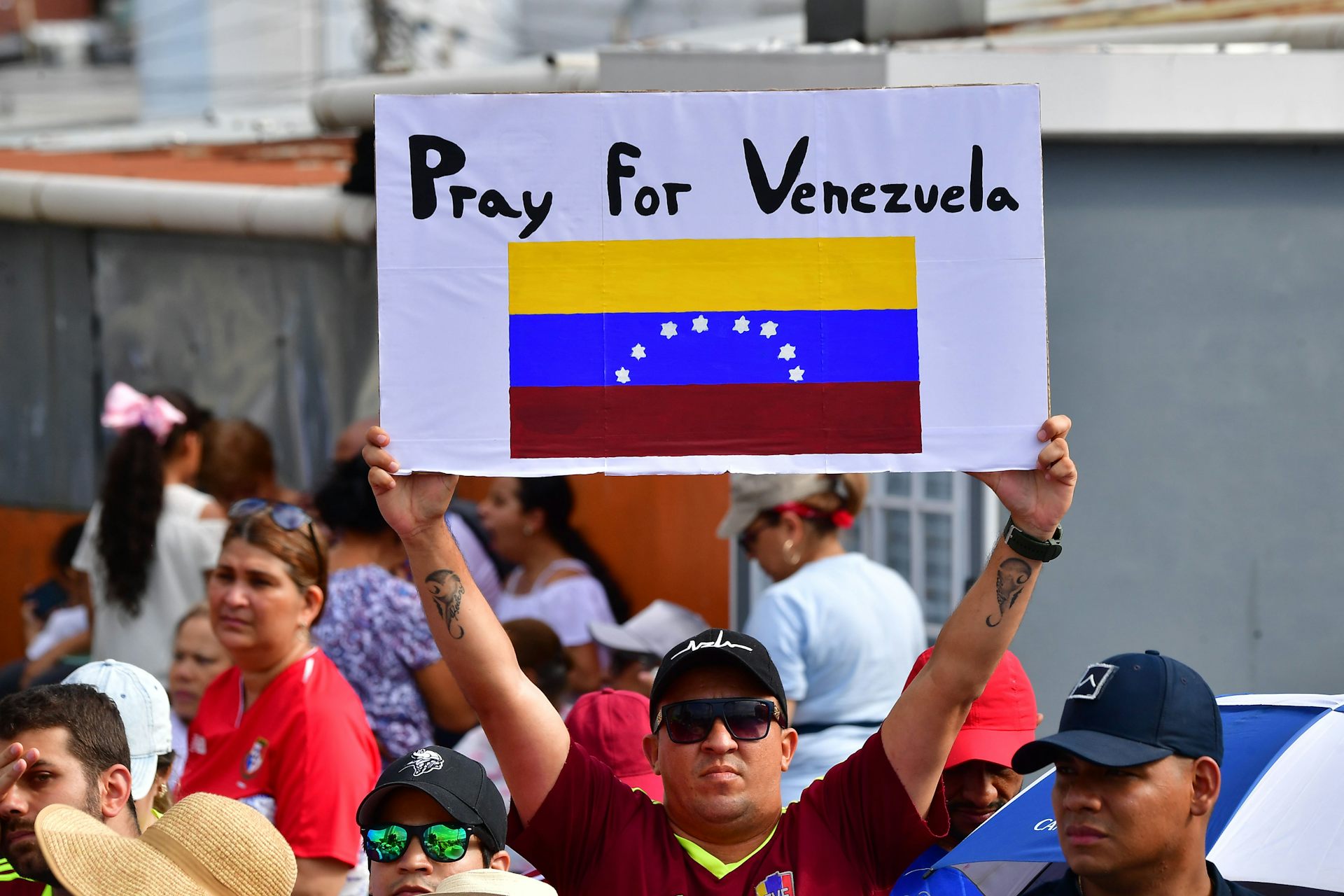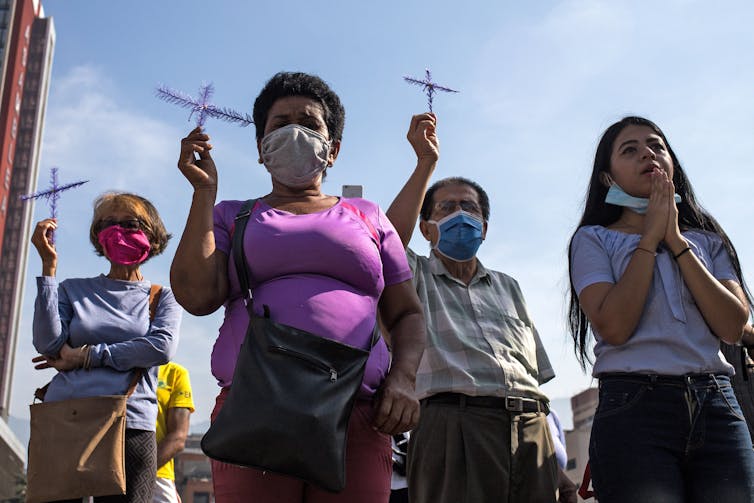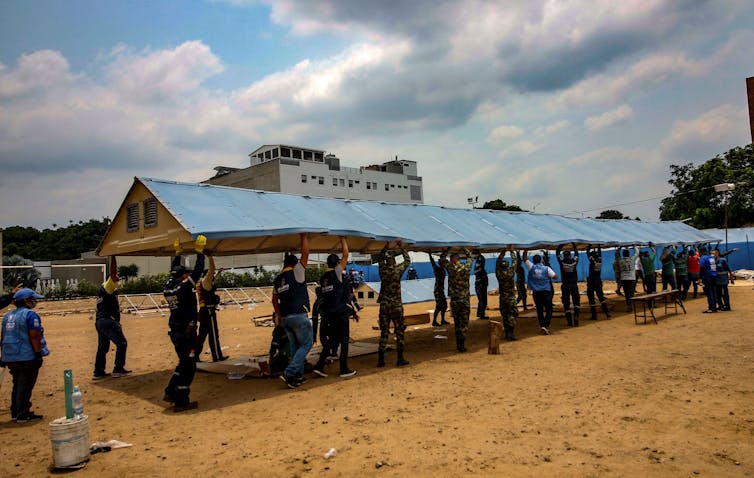
Coronavirus hasn’t yet hit Venezuela as hard as neighboring Brazil and Colombia. But after years of economic and political crisis, the country’s institutions are in ruins and experts agree Venezuela is ill-prepared for a pandemic.
As the stalemate between interim President Juan Guaidó and de facto President Nicolás Maduro enters its second year, civil society and world leaders are pushing for an emergency agreement that would enable Venezuela to mount a coordinated response to coronavirus.
It will be next to impossible for Maduro’s cash-strapped government to address the coming crisis without significant international financial assistance. Only Guaidó, who is recognized as Venezuela’s legitimate leader by the United States and most countries in the Americas and Europe, can secure that help.
Many advocates are calling upon international actors like the European Union, United Nations or the Vatican to engage the conflicting parties.
As sociologists who have studied religion in Venezuela for years, we are tracking this last possibility closely. We find the Catholic Church is in some ways well positioned to aid Venezuela in this latest crisis. But its power to help is also limited.

Broad approval for Catholic Church
On March 30, Venezuela’s Catholic Church issued a widely circulated message asking all political leaders to “act decisively to reach a fundamental consensus” that would enable Venezuela to “overcome the serious current public health and socio-economic juncture.”
In his Easter message, Pope Francis called for a cease of conflicts around the world. He added “in Venezuela, may [God] enable concrete and immediate solutions” to “permit international assistance to a population suffering.”
But so far, neither the Venezuelan Catholic Church nor the Vatican have followed up with concrete efforts to broker an agreement between the Maduro government and the opposition.
Historically, faith leaders have played an important role in addressing conflict and violence in Latin America, helping gang members start a new life, supporting peasants confronting landowners or mediating between conflicting parties. In nearby Colombia, the church was a fundamental player in the peace process that ended the FARC guerrillas’ 52-year insurgency against the government.
The Church’s ability to engage in conflict resolution has come about in Latin America in part because it has a bureaucratic structure and administrative districts across the entire region. The Vatican also has an experienced diplomatic corps.
Seventy-three percent of Venezuelans identify as Catholic. And in a society in which the courts, parties and most every other institution of public life are discredited or deeply polarizing, opinion polls consistently show that the Catholic Church has high approval ratings.
Pope Francis – the first Latin American to lead the Catholic Church – has shown considerable interest in Venezuela since assuming office in 2013, sending Vatican participants to two rounds of dialogue between the Maduro government and the opposition.
The Pope even has some Venezuela experts in his administration. His secretary of state, Msgr. Pietro Parolin, was the Vatican’s ambassador to Venezuela from 2009 to 2013. And Arturo Sosa, Superior General of the Jesuit order – the religious order that Francis is part of – is himself Venezuelan.
The perils of principles
But past efforts to mediate in Venezuela’s conflict reveal the limits of the Catholic Church’s capacity to influence the political stalemate there.
The Church’s power, in Venezuela and worldwide, is symbolic. It has no way of actually enforcing political agreements. That makes the Church sensitive to conflicting parties actually respecting its authority.
In 2016 both the opposition and the Maduro government requested Vatican involvement in negotiations. That process eventually resulted in an agreement to recognize Venezuela’s opposition-dominated National Assembly and rid the national electoral authority of its Maduro-dominated directors.
But the Maduro government failed to follow through in good faith. So in January 2017 the Vatican withdrew from further involvement in Venezuela’s conflict and recalled its envoy.

Two years later, amid a crisis caused by the National Assembly’s designation of Juan Guaidó as interim president, Maduro asked Pope Francis for renewed Vatican mediation.
In a private letter that was later leaked, the Pope demurred “because what had been agreed in the meetings was not followed by concrete gestures.”
‘Positive neutrality’
Since the failed 2016 negotiations, both the Vatican and Venezuela’s national Catholic Church hierarchy have maintained what they call “positive neutrality.”
By positive neutrality, Church leaders mean the effort to engage leaders on both sides of the conflict while pushing for democratic elections, humanitarian aid and political dialogue. They denounce the Maduro government for its bleak human rights record and denial of Venezuela’s humanitarian crisis. They also criticize the opposition for violent protests and unwillingness to negotiate.
Our tracking of the Church’s public discourse in Venezuela shows that its message has been remarkably consistent throughout the government of Nicolás Maduro.
But in polarized Venezuela, neutrality of any kind is rarely well received.
Opposition members have long complained about the Vatican’s willingness to stay on the margins of a conflict that has seen protesters beaten, opposition leaders jailed and democracy dismantled. They see Pope Francis as appeasing an authoritarian with dictatorial plans.
The Maduro government, for its part, views the local Catholic hierarchy as an ally of the opposition. Indeed, Venezuela’s bishops have openly supported the presidential claims of Juan Guaidó.
Religious authority
Nonetheless, political leaders on both sides consistently seek the blessing of the Venezuelan Catholic Church and the Vatican’s involvement on their behalf.
Our research confirms that the Church has a level of approval and moral authority in Venezuela that crosscuts political powers. That gives it the potential to alter a conflicted equilibrium.
But this moral authority is fragile, and both the Venezuelan Church and the Vatican jealously guard it. Having been defied once by Maduro, the Pope may be disinclined to back another mediation that might fail.
Meanwhile, the coronavirus pandemic appears certain to deepen what is already a tragic humanitarian emergency.
David Smilde, Professor of Sociology, Tulane University and Hugo Pérez Hernáiz, Professor of Sociology, Universidad Central de Venezuela
This article is republished from The Conversation under a Creative Commons license.


